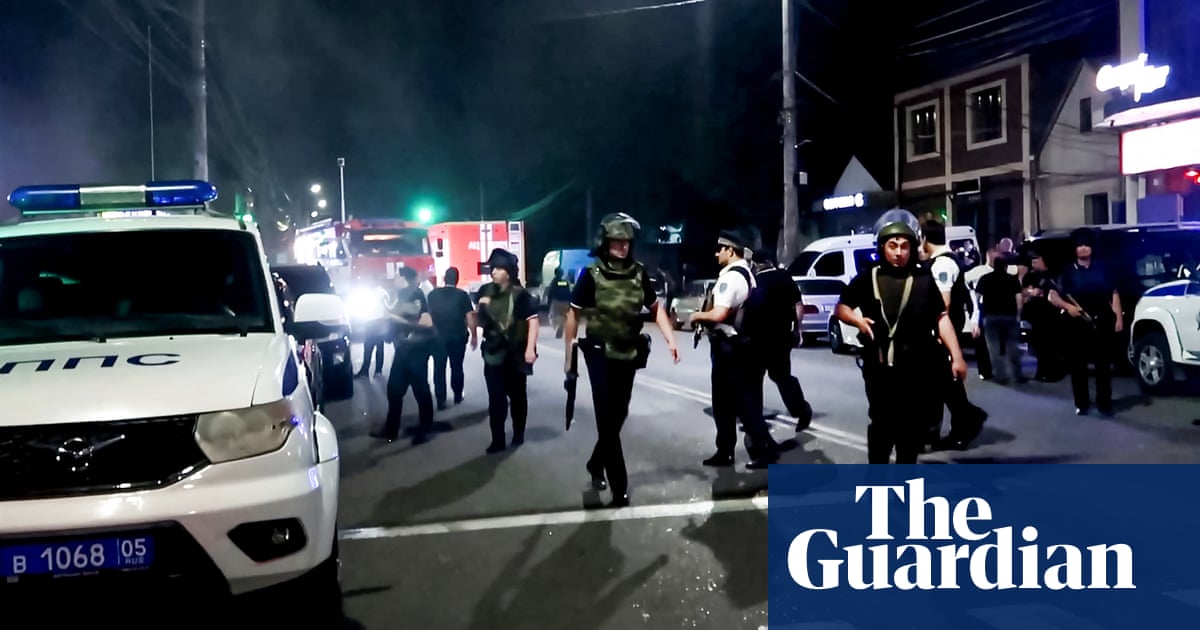Five people responsible for multiple gun attacks targeting churches and synagogues in Russia’s Dagestan region have been “eliminated”, said the authorities as the region began three days of mourning.
A criminal investigation has been launched under anti-terrorism laws after gunmen killed 19 people in co-ordinated attacks in two cities in the restive region in the North Caucasus.
Russia’s Investigative Committee said 15 law enforcement officers and four civilians, including a Russian Orthodox priest, were killed during attacks on religious buildings in the cities of Derbent and Makhachkala on Sunday evening. Two Orthodox churches, two synagogues and a police checkpoint were attacked.
Reuters reported that gunmen with automatic weapons burst into an Orthodox church and a synagogue in the ancient city of Derbent, setting fire to an icon at the church and killing a 66-year-old Orthodox priest, Nikolai Kotelnikov.
The Russian Orthodox church said Kotelnikov had been “brutally killed” in the attack.
The Russian president, Vladimir Putin, offered his “deepest condolences” to those who had lost loved ones in Dagestan and Crimea, the Kremlin said on Monday.
Separately, Russia has blamed the US for a Ukrainian attack on annexed Crimea that it said had killed four people and injured 151.
The Kremlin statement came hours after Russia’s allies, China and Azerbaijan, which borders Dagestan, offered their condolences.
The committee said five people involved in the crime had been “eliminated” and that their identities had been established. Others involved in the attacks had also been identified, the committee said, without revealing how many attackers it believed were responsible for the shootings.
In a separate statement, Russia’s anti-terrorism committee, which is responsible for foiling terror attacks, said two “bandits” had been “neutralised” in Derbent and three in Makhachkala. The Russian government body published photos of men in military fatigues emblazoned with “FSB” – the initials of Russia’s security service – standing in in darkened corridors and stairwells, brandishing weapons, as well as a handgun on a bloodstained floor.
In its statement on Monday morning, the anti-terrorism committee said a special counter-terrorism operation had been concluded.
Independent media have not been able to verify how many people were killed in the attacks.
after newsletter promotion
The assault came three months after 145 people were killed in an attack claimed by the Islamic State on a concert hall near Moscow. The attack on Crocus City Hall was Russia’s worst such attack in years and raised concerns that the war on Ukraine and crackdown on internal dissent had distracted authorities from Islamist terror threats.
Putin initially accused Ukraine of being involved in planning the concert hall attack, despite no evidence that Kyiv was responsible, while an IS affiliate repeatedly claimed responsibility.
Dagestan has also reported an increase in the number of antisemitic incidents: last year, a mob in the mostly Muslim region stormed the airport at Makhachkala looking for Jewish passengers arriving from Israel.
So far, no one has immediately claimed responsibility for Sunday’s attacks.
“We understand who is behind the organisation of the terrorist attacks and what goal they pursued,” Dagestan’s governor, Sergey Melikov, said, without offering further details. The search for the gunmen will continue until all of them are identified, he said.
Three days of national mourning have been announced, with flags lowered to half-mast and all entertainment events cancelled.

